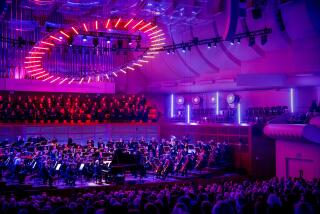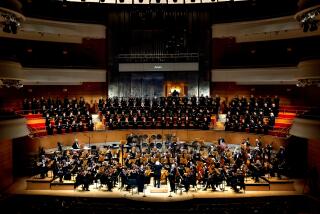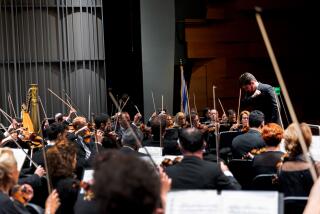Recordings
- Share via
Not since the blissed-out ‘60s has there been this kind of interest in Scriabin’s psychedelic symphonic poem-piano concerto “Prometheus”--wild music that combines sexual yearning and religious ecstasy into a rich harmonic soup with, if you follow the composer’s instructions (and no one does), the addition of a light show to go along with it.
We’ve had two live performances of “Prometheus” this past season and now three new recordings. Gergiev’s rapt performance, with the flamboyant Toradze as ideal collaborator, is drenched with color and played to the hilt--just the musical orgy that Scriabin was after. Boulez is cooler but, in his way, just as colorful, and he offers a fascinating look at this piece, written in 1911, that seems to presage all the harmonic experiments that would preoccupy the composers for the rest of the decade. Urgorsky’s wonderfully fluid pianism is an added attraction. In comparison, Rozhdestvensky and his wife, Postnikova, seem a bit vague and heavy-handed, although the performance does capture a certain Wagnerian spirit well enough.
Scriabinites will want the Boulez for its equally revelatory “Poem of Ecstasy” and a wonderfully bright performance of the early, Chopin-esque Piano Concerto. Rozhdestvensky and Postnikova weigh their performance of the Piano Concerto down with lumbering tempos, although they add to the curiosity of the early Fantasy--Scriabin’s first, unfinished attempt at a piano concerto--in a version orchestrated by Rozhdestvensky. Gergiev serves up, instead, a heady “Firebird” that powerfully demonstrates Stravinsky’s Russian roots.
More to Read
The biggest entertainment stories
Get our big stories about Hollywood, film, television, music, arts, culture and more right in your inbox as soon as they publish.
You may occasionally receive promotional content from the Los Angeles Times.











